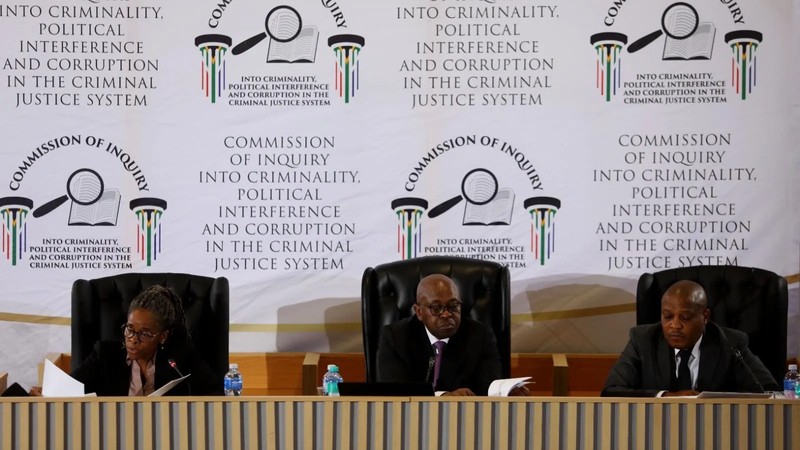Madlanga Commission: Detective claims Judge was biased in granting ‘KT’ Molefe bail
Acting Judge President of the Gauteng High Court in Pretoria, Aubrey Phago Ledwaba, has been accused of being biased while granting bail to controversial businessman and murder-accused Katiso ‘KT’ Molefe.
This was the testimony delivered before the Madlandla Commission on Thursday by Witness B, a detective with the SAPS Gauteng Organised Crime unit.
The detective, whose identity is being protected, is investigating the murder case of Armand Swart, a Vereeniging engineer who was gunned down on April 17, 2025.
Molefe is charged with Swart’s murder, alongside three alleged hitmen, Warrant Officer Michael Pule Tau, Musa Kekana, and Tiego Floyd Mabusela.
Witness B told the Commission that she is of the view that Ledwaba’s decision to grant Molefe bail was premeditated.
“In June 2025, the matter was heard at the Gauteng North High Court in Pretoria, the presiding officer was the Acting Judge President Ledwaba. During the hearing, I was very uncomfortable with what was transpiring; in particular, it felt to me that the Judge had already predetermined the matter.
“Although this is not uncommon, it seemed that he was intent on giving Mr Molefe, who is accused of very serious offences, lenient bail conditions,” Witness B said.
She stated two exchanges, in particular, stood out.
“In one of the exchanges related to the conditions related to Mr Molefe’s movement, Mr Molefe’s lawyer asked for movement within the Gauteng province or even house arrest. The judge, of his own accord, enquired ‘whether that would not be too restrictive as Mr Molefe had businesses in other provinces’.
“Mr Molefe’s lawyer responded that he (Molefe) does a number of business matters where there are business-related reasons for travel. These would be communicated, and written permission of the investigating officer will be sought, which cannot be unreasonably withheld,” the witness said.
She added that the Judge then raised the issue of Molefe’s child and girlfriend who live in KwaZulu-Natal, to which Molefe’s lawyer responded that they could travel to see Molefe.
“Despite Mr Molefe’s lawyer’s acceptance of this well-established condition, the Judge made a comment that ‘bail should not be a punishment’. In the end, the bail condition that was granted allowed Molefe (to travel) after informing the IO (investigating officer), and the IO could not object unless there was a valid reason,” the witness said.
Reflecting on the Judge’s conduct, the witness said, when Ledwaba inquired ‘if this would not be too restrictive’, this showed her that he was already showing signs of leniency towards the accused.
“The accused was the one applying for bail, and already placing on record what he was willing to accept, but the Judge felt this was ‘too restrictive’. I felt like the Judge showed too much leniency towards the accused, and that’s where I already knew that he (Molefe) was going to be granted bail already,” she said.
Witness B Molefe’s lawyer indicated his willingness to accept the bail condition that his client had to report regularly to a police station.
“It was the Judge who expressed the view that it would be ‘a burden on Mr Molefe to report to the station because he finds that the investigating officer is not there’. Mr Molefe’s lawyer, in turn, agreed,” she said.
“It was an agony for me to sit in that court to listen to all this, because the (bail) verdict was already out. I even went and made a call to my commanders to say, ‘Can I please withdraw (from the investigation)?’” she said.
The commanders, however, declined her request.
Molefe was eventually released on bail.
On Monday and Tuesday, Witness A, a colleague of Witness B, testified that informants had told the investigating officers prior to the bail hearing, that Molefe would be granted bail and that a R2.5 million ‘bribe’ would allegedly be paid to buy his freedom.
Witness A said there were red flags that would normally have seen an accused denied bail.
Molefe has a criminal record in the United Kingdom, dating back to 2004, when he was arrested for possession of dagga and an illegal firearm, and allegedly travelled using a fake passport under the name David Teboho Lebetsa, which has a different date of birth.
Witness B earlier said the Political Killings Task Team had played a vital role in Molefe’s arrest ‘given the high level of interference at the scene by other law enforcement units of the SAPS’.
She said that a Johannesburg Metropolitan Police Department officer, Johannes Mokgatle, had falsely reported sick for work, only to be found at Molefe’s house during his arrest; that a Hawks team challenged the operation and described it as bogus and helicopter from the Gauteng Traffic Police hovered above them as they carried out the operation.
The Madlanga Commission of Inquiry is investigating allegations of collusion and corruption between politicians, senior police, prosecutors, intelligence operatives, and elements of the judiciary.
The allegations were first made KwaZulu-Natal Provincial Police Commissioner Lieutenant General Nhlanhla Mkhwanazi in July.
gcwalisile.khanyile@inl.co.za

